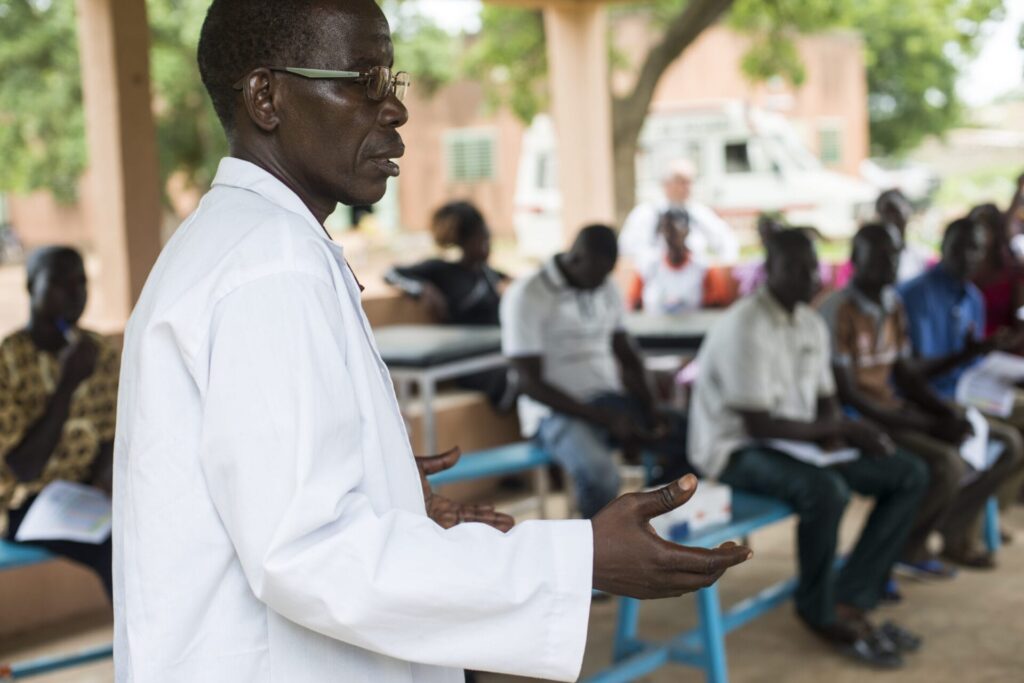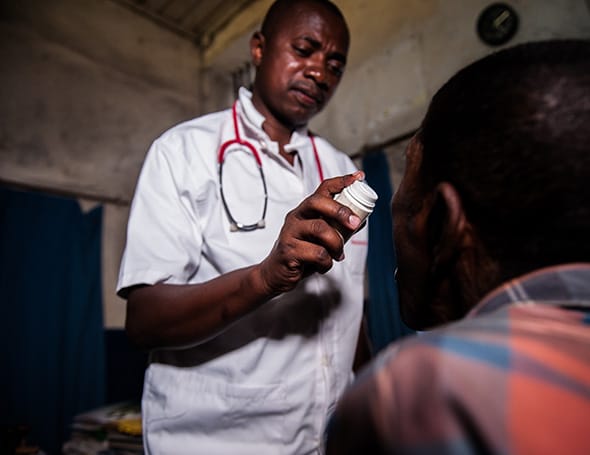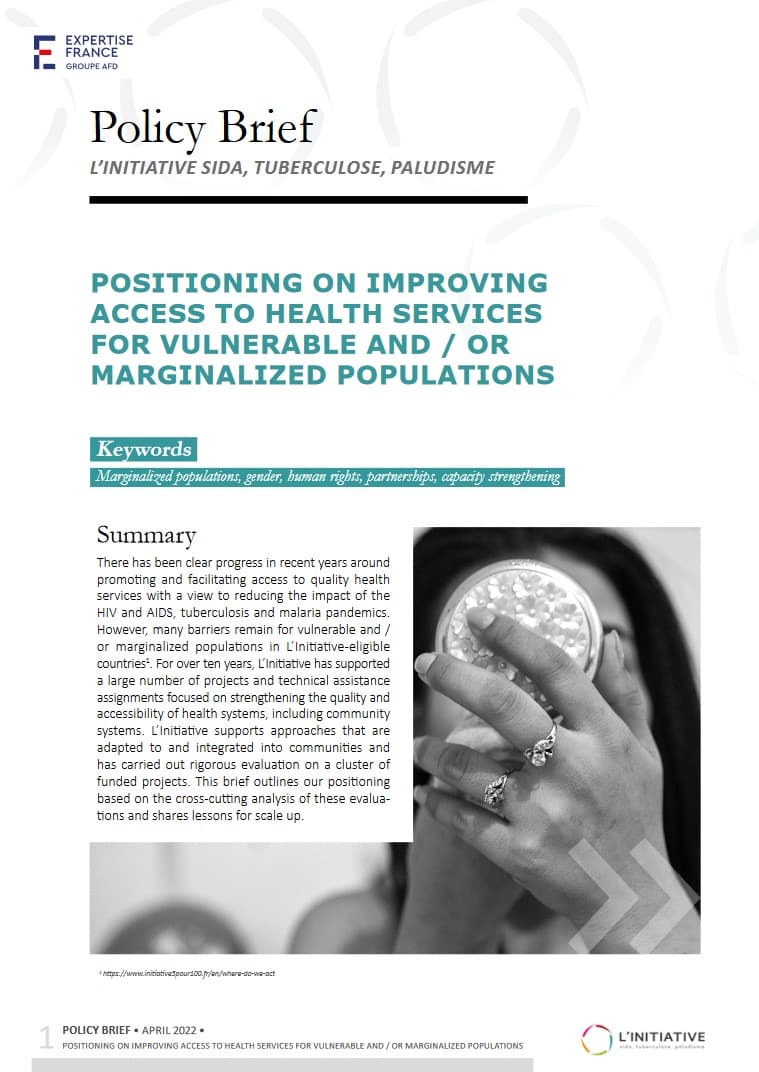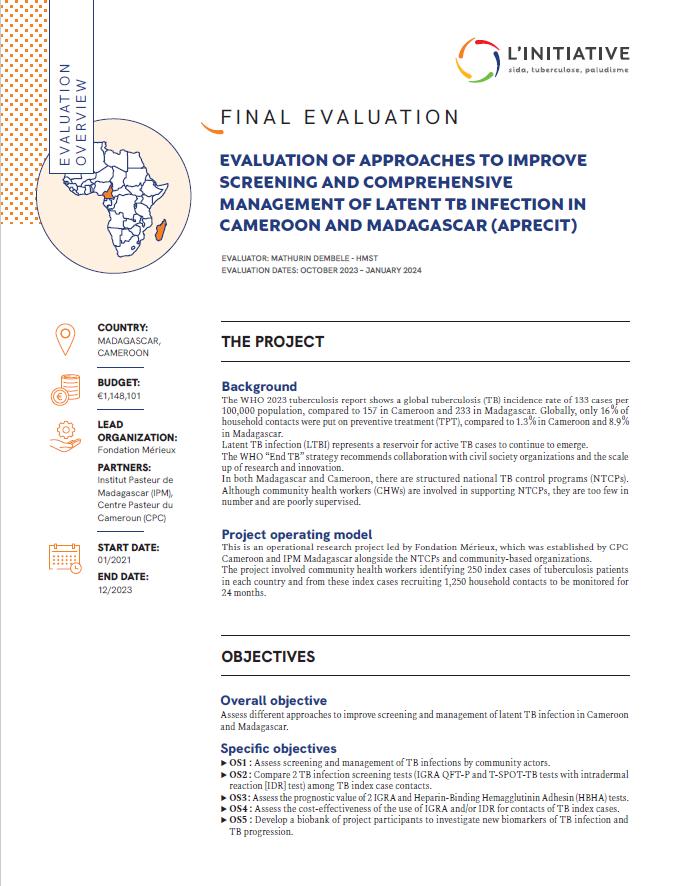The availability and quality of health workers are essential to build resilient and sustainable health systems. The Initiative makes strengthening human resources a priority for access to quality care.
A weak link in many health systems in the countries where the Initiative operates, a powerful human resources strategy is nevertheless essential to resolving major health challenges, including the HIV-AIDS, tuberculosis and malaria pandemics.
“There will be no sustainable progress in access to health services and in the fight against pandemics without more support and investment in human resources in health.”
Eric Fleutelot, directeur technique du Pôle Grande Pandémies, Département Santé d’Expertise France
Human resources, the cornerstone of health systems
For sustainable and resilient health systems , the Initiative strengthens the knowledge, skills, motivation, distribution and practices of all personnel involved in the health field. Our actions are aimed at professionals with clinical responsibility (doctors, nurses, midwives, pharmacists and community health workers), as well as the people who support them (healthcare service managers, administrative officers, laboratory technicians, social workers and community workers such as peer educators).
The WHO Global Strategy on Human Resources for Health to 2030 describes four major challenges in HRH. The first concerns the shortage of personnel (a phenomenon amplified by the Covid-19 crisis) which affects all regions of the world. It particularly affects low-income countries, where some of their doctors are moving abroad. Beyond this quantitative aspect, the WHO also emphasizes the inadequacy of professional training and career monitoring of caregivers, as well as the problems of their geographical and demographic distribution . Finally, optimizing HRH requires a significant effort to improve the working conditions of caregivers, to fuel their motivation to continue their missions with peace of mind.
Our strategy: to increase investments in human resources for health
Human resources for health are a strategic priority for the L’Initiative 2023-2025 funding cycle. This commitment takes the form of funding for projects that contribute toward promoting human resources for health. L’Initiative pays particular attention to activities which focus on:
- Initial and continuing training for health care workers
- Supporting the labor market;
- Supporting public policies relating to human resources for health;
- Combating gender inequalities and integrating approaches to health that are sensitive to this issue.
The Accelerator supplements the array of actions taken by L’Initiative to help consolidate human resources for health. Launched in 2023, this new tool allows us to respond to previously neglected challenges in global health and the fight against pandemics. It is intended to prioritize issues associated with the careers and training of health care professionals in the French-speaking countries of sub-Saharan Africa.
The investments in human resources for health granted by L’Initiative may be linked to the roll-out of the WHO Academy.
Our actions: train, finance and evaluate
Using our various support mechanisms, L’Initiative makes strengthening human resources for health a catalyst for transforming health systems and achieving fairer health services. Our aim is to ensure access to high-quality services that respect everyone’s dignity, including the most vulnerable populations..
Consolidate skills and knowledge
Through its calls for projects, L’Initiative encourages the partners it funds to take into account the challenges related to the training of human resources in health in their interventions. It disseminates the lessons and good practices resulting from the evaluations of the projects it funds in order to improve future projects.
The BFELTP program in West African states is an illustration of this commitment and has benefited from a significant
financial investment from L’Initiative, through L’Accélérateur. Each year, it organizes the training of around sixty professionals in epidemiology and public health, in a context of emergence and re-emergence of infectious diseases.

Evaluating our actions in favor of HRH
4 projects from the 2016 call for projects aimed at “setting up resilient and sustainable systems” have recently been the subject of a cross-sectional evaluation .
This work has made it possible to learn from the experience accumulated during these projects and to promote best practices with the aim of learning and improving the quality of future projects funded by L’Initiative.
The results have demonstrated the importance of perpetuating the actions implemented , in particular by ensuring that future training actions and structures can be financed. The report also highlights the need for project leaders to follow a meticulous training engineering approach .
The conclusions of this evaluation are now being disseminated to project leaders to inspire quality training systems, which benefit the strengthening of human resources in health.



